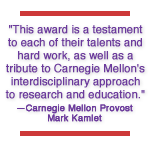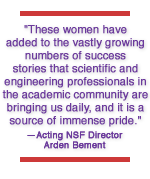|
|
||||||
|
|
Yoky Matsuoka and Jennifer Lerner Receive NSF's Presidential Early Career Award
President Bush makes presentation in a White House ceremony
The PECASE program recognizes outstanding scientists and engineers who, early in their careers, show exceptional potential for leadership at the frontiers of knowledge. It is the highest national honor for researchers at the beginning of their careers.
"It is a tremendous honor for Carnegie Mellon that two of our young faculty members have received the Presidential Early Career Award. This award is a testament to each of their talents and hard work, as well as a tribute to Carnegie Mellon's interdisciplinary approach to research and education," Carnegie Mellon Provost Mark Kamlet said.
In another example, the group develops wearable assistive devices to restore movements for those without them. Through its research, Matsuoka's group is expected to help individuals with strokes, spinal cord injuries and traumatic brain injuries to move naturally using their own neural signals again. Matsuoka also holds appointments in the Center for the Neural Basis of Cognition and the Department of Biomedical Engineering.
Lerner is a member of the Department of Social and Decision Sciences in the College of Humanities and Social Sciences, and is head of the Emotion and Decision Laboratory at Carnegie Mellon. Drawing primarily on psychology as well as economics and neuroscience, the lab examines the influence of emotion on human thought and action. Lerner's recent work revolves around two domains: judgments of risk and choices in economic transactions.
Matsuoka and Lerner are among 57 PECASE awardees nationwide. Of the 20 recipients, including Matsuoka and Lerner, who conduct NSF-supported research, a majority are women.
"It is gratifying that we now see broadening opportunities for women becoming successes, not only in the labs and classrooms, but within the entire scientific community, and recognized publicly, as the president today has done," said Arden Bement, acting director of the National Science Foundation. "These women have added to the vastly growing numbers of success stories that scientific and engineering professionals in the academic community are bringing us daily, and it is a source of immense pride."
Jonathan Potts |
||||
|
Carnegie Mellon Home |
||||||


 Matsuoka is head of the
Matsuoka is head of the  After the Sept. 11, 2001, terrorist attacks, Lerner and her colleagues found that Americans who experience anger over the attacks are more optimistic about the future, less likely to take precautionary actions and more likely to favor aggressive responses than those who experience fear. More recently, Lerner authored a ground-breaking study that found that seemingly incidental emotions can influence the prices at which individuals buy and sell goods. Lerner's research revealed that people who are sad are willing to accept less money to sell something than they would pay for the same object.
After the Sept. 11, 2001, terrorist attacks, Lerner and her colleagues found that Americans who experience anger over the attacks are more optimistic about the future, less likely to take precautionary actions and more likely to favor aggressive responses than those who experience fear. More recently, Lerner authored a ground-breaking study that found that seemingly incidental emotions can influence the prices at which individuals buy and sell goods. Lerner's research revealed that people who are sad are willing to accept less money to sell something than they would pay for the same object.